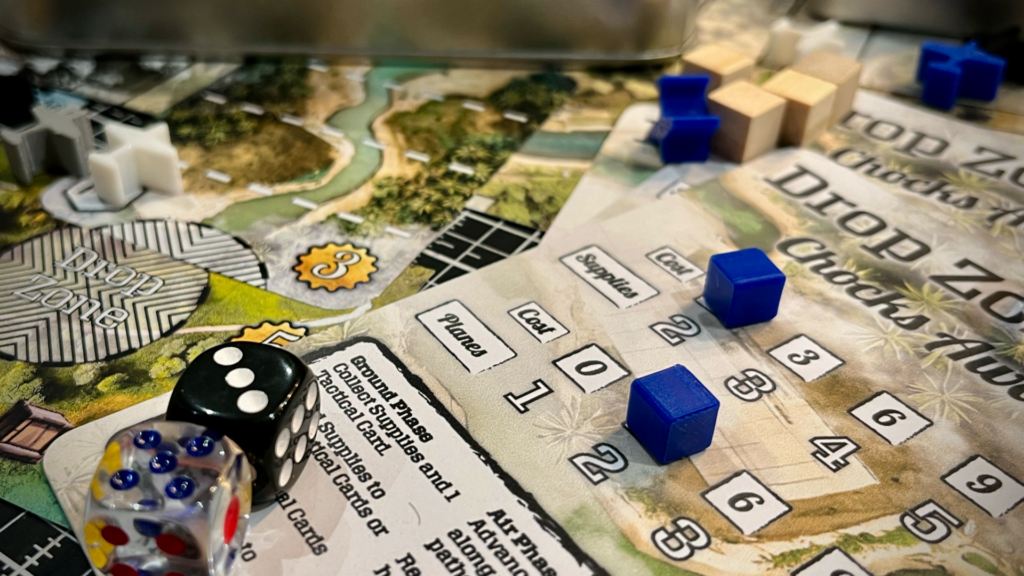
I want to extend my thanks to all the contributors for sharing their experiences with us in today’s post. This shared approach to posting is easily my favourite, as it we get to hear so many different perspectives on the same ideas.
It’s intriguing to see how each person manages to balance work, family, and creative pursuits like game design. The insights shared are both inspiring and enlightening, offering a valuable look into the diverse paths we take on our creative journeys.
Thanks to these voices for joining this discussion and broadening the understanding of life’s balancing act. Make sure to given them a follow on instagram!
Evan | @sleepless_knights_games
Balancing work, family, and a creative passion like board game design is both rewarding and challenging. With two young children who find it hard to settle at night, attending real-life playtesting sessions can be tricky, so I’m fortunate to have an understanding, fairly local playtest group that doesn’t mind me arriving late after putting the kids to bed. My kids are still too young to help, but I look forward to the day when they can join me in playtesting. Until then, home and online playtesting help me make steady progress while keeping time management in check.
My wife, who works long hours as a nurse for the NHS, is incredibly supportive of my dreams despite her own busy schedule. Even after her lengthy commutes and shifts, she still offers her time to playtest and give feedback on my games. We rely on each other, balancing our careers, family responsibilities, and individual goals. Her encouragement fuels my creativity, and we’re each other’s biggest supporters, which makes it easier to balance everything, knowing we’re working towards our dreams together.
Her encouragement fuels my creativity, and we’re each other’s biggest supporters.
Working full-time from home allows me to find pockets of time to design, often using my lunch breaks to prototype or brainstorm. I’ve also turned to digital tools like Tabletop Simulator to create versions of my games for online playtesting, especially with the #BoardGameProtoHype group. Though design sometimes comes last, I’m content with the balance I’ve achieved and excited for the future, knowing that as the kids grow, they might even become playtesters themselves, sharing in this passion.
Jennifer Abele | @jra_game_design | JenLikes – YouTube
I’ve never loved the term “work-life balance” as it implies that life is somehow paused when you’re working. Not only that, it implies that work should have equal importance to the entire rest of your life, which encompasses your health, your hobbies, your family, etc. I prefer to think of life as a handbag of a fixed size and I am trying to fit all the things in my life, including work, into that bag.
I prefer to think of life as a handbag of a fixed size and I am trying to fit all the things in my life, including work, into that bag.
As a full-time Aerospace Engineer, over the last 20 years of my career, work has often been the largest thing in the bag, but it’s never been the only thing. I have always made sure there’s been room for my relationships and responsibilities. What I haven’t been so good at is making sure there is always room for my hobbies, particularly game design. While some folks are able to make game design their full-time job and can pay their bills, that’s not the path I am on. This means that it often takes me a significantly longer time to get games to the table than other designers.
This year, when the summer weather was in full swing, my social obligations increased, and my “capitalism job” of engineering got particularly busy. I chose to take game design out of the bag for a few months, putting my games on pause. This was a conscious decision on my part; other designers may prioritise the contents of their bag differently. The autumn rains have now returned, folks are retreating indoors, and work seems to be slowing down. As we near the winter holidays, I will be utilising more room in my bag for game design
Bryce Lowe | @RummathonRoyale | get.rummathonroyale.com
Navigating the intricate dance of game design amidst my daily life can feel like a juggling act at times, with each responsibility requiring attention, while also trying to keep my creativity afloat. For many of us, life is a whirlwind of constant responsibilities, from work commitments to family obligations, making it challenging to carve out dedicated time for creative pursuits. The early mornings—between 6 and 8 a.m.—are my secret weapon. In this quiet solitude, before the world wakes up, I immerse myself in game design, free from external distractions. It’s a time for my creativity to flourish, allowing me to refine my vision without the interruptions of daily life.
Weekends also serve as another opportunity to dive into my creative reservoir. While many use weekends to relax or socialise, I embrace these moments to brainstorm new mechanics or revisit existing ones. It’s a chance to playtest with friends, gather feedback, and tackle the nitty-gritty of game mechanics. Over time, I have learned through this process the importance of consistency. In game design, where every rule and card plays a vital role, small, concentrated efforts in my creative practice can lead to substantial progress as well. Whether it’s noting ideas or playtesting new concepts, every bit contributes to the greater picture.
I’ve learned that stepping away from the game design desk to enjoy moments with loved ones rejuvenates my creative batteries
Juggling family time, social obligations, and downtime is essential for avoiding burnout. I’ve learned that stepping away from the game design desk to enjoy moments with loved ones rejuvenates my creative batteries. It’s a delicate dance, ensuring that my love for game design remains vibrant while cherishing the relationships and moments that truly matter. This balance keeps the creative sparks alive, allowing me to produce a game that reflects not just great mechanics but also the joy of connection and shared experiences.
Sarah Curtiss | @csquared_games | csquaredgames.com
Ian and I, the creators of CSquared Games, have had to take a hard look recently at what work-life balance means to us. And what it came down to was creating a structure that helped separate our working lives from our marriage.
After working together for almost a year, we found that our games, Iberia: Kings and Emirs and Balance of Powers, were the predominant thing we talked about. While cooking eggs Ian would have a breakthrough idea, while doing laundry I would have a new design for cards, and at dinner we would be discussing marketing strategies and branding. It just became too much. We found we were surrounded by work and not enough by the other things we liked to do as a couple.
While cooking eggs Ian would have a breakthrough idea, while doing laundry I would have a new design for cards.
So, what have we done? We are trying a new model. We have a weekly meeting set in the calendar after our daughter goes to bed. Though we are tired, we are guaranteed not to be interrupted. We check in with each other before we start our meeting. We discuss how we feel, we acknowledge the other person, we discuss our needs and what we own, and finally, our struggles. This helps get us on the same page. Then we have an agenda. We both contribute to the agenda earlier in the day and we take notes as we go through the meeting. This gives us data on things we have talked about, what we need to follow up on, and successes we want to celebrate.
We are a month in on our new model and it’s been great to not talk about work all the time. We write our ideas and points of discussion down for our meetings and carry on with life as we always have. Who knows how this model will evolve, but it was important for us to share experiences in striking a balance as a husband and wife team.
A big thank you goes out to Evan, Jennifer, Bryce and Sarah for sharing their experiences and insights with us. If you found their stories engaging, I encourage you to follow them on Instagram to keep up with their journeys in game design and beyond.
Don’t forget to stay connected with the What if? Blog as well! Sign up for blog updates at the link below to receive more content like this directly to your inbox.


